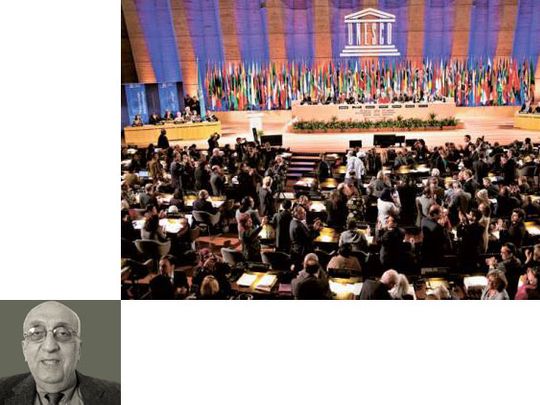
The Unesco General Assembly's endorsement of Palestine's admission to full membership was greeted with great jubilation by Arab-Americans in Washington, especially Palestinians and Arab diplomats, as witnessed on the internet and the social media.
It was also a step that Arabs everywhere felt was long overdue, but came at the right time since expectations were high that the United Nations may soon open its gates wide for the Palestinian people who lost their homeland more than 63 years ago which remains occupied by Israel.
On the other hand, the immediate American action to cut funding for the international organisation, tasked by the UN to handle education, scientific and cultural matters worldwide, served as a serious blow to many countries, especially in Africa and Asia.
But regardless of the US decision which was preceded by threats to this effect, representatives of 107 countries, including France, heartily endorsed Palestinian membership with an unprecedented loud cheer from delegates who jumped to their feet during the memorable session of Unesco's General Assembly.
The US and Israel were among the meagre 14 member-states who voted against the decision while 52 others did not want to take sides. These abstentions do not count in the final tally.
Consequently, the US (and Israel) are bound to be chastised in the coming days, if not pay a high price for their shortsightedness. Moreover, the Obama administration's shameless refusal to honour its scheduled donation of $60 million as punishment should not pose a serious obstacle to the world body as surely the oil-rich Arab states (and others) ought to step forward and replace the American handout.
It may be that the Obama administration had its hands tied by old legislation that promised to punish Unesco and other international organisations should they admit the Palestinians to their groups before a Palestinian-Israeli peace agreement is signed.
US policy-makers, influenced by the pro-Israel lobby, have turned a blind eye to what the Palestinians had agreed to in the 1993 Oslo Accords with Israel; more so with their repeated offers to pursue peace talks provided Israel stops its usurpation of Arab property in the West Bank.
More disappointing, none of the world powers have shown any willingness to lean hard on Israel to come to terms with the Palestinians, even endorse President Barack Obama's suggestion that they should go back to the 1967 armistice lines which the Palestinian now accept as the framework for their projected state.
New scenario
Palestine's new membership with Unesco allows it to join several other international organisations, including the International Atomic Energy Agency (IAEA). Moreover, it is now certain that "if an increasing number of UN agencies admit Palestine as a member state, it strengthens their claim to statehood, internationalises the Israel-Palestine conflict, and opens up avenues previously closed to the Palestinians to pursue grievances related to the Israeli military occupation of their lands".
However, from all this American hoopla about abandoning Unesco, wrote M. J. Rosenberg, a Senior Foreign Policy Fellow at Media Matters Action Network, "it appears that both the White House and Congress will put Israel's demands above US interests of the most fundamental kind".
Additionally — and equally troubling — this Unesco saga has come at a time when the revolutions precipitated by the Arab Spring in the first three autocratic Arab regimes — Tunisia, Egypt and Libya — now seem to be on more solid ground. This appears to be not the case with the uprisings in Syria and Yemen where the leaders still remain elusive.
And, as always, Israel is now attempting to divert attention from the recent Arab accomplishments to claim, in the words of Prime Minister Benjamin Netanyahu, that "a nuclear Iran would be a serious and direct threat to Israel".
He believes that "a nuclear Iran poses a heavy threat to the entire world — and to Israeli in particular," promising to continue "to act against those who try to harm us". His statement was seconded by Defence Minister Ehud Barak, who underlined, according to Haaretz, that all options are on the table in terms of dealing with Iran.
Maybe it is time for the US to take a step back from Israel, or else the price of this gamble may be too high.
George S. Hishmeh is a Washington-based columnist. He is a former editor-in-chief of The Daily Star.










